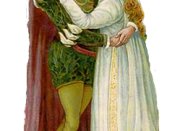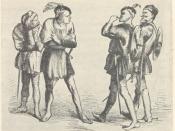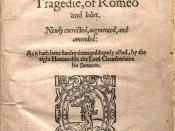A CRITICISM ON THE MORALITY OF WILLIAM SHAKESPEARE'S
ROMEO AND JULIET
Does Romeo and Juliet need an introduction? Of all Shakespeare's plays, it has been the most continuously popular since its first performance in the mid-1590's. It would seem, then, the most direct of Shakespeare's plays in its emotional impact. In this paper, the researcher examines the play Romeo and Juliet, its contents, characters, setting and theme being criticized.
During his second period, Shakespeare brought historical drama and Elizabethan romantic comedy to near perfection. Particular in his histories and comedies of this period, Shakespeare demonstrated his genius for weaving various dramatic nations into a unified plot, rather than writing a series of loosely connect episodes. Throughout the second period, Shakespeare moved steadily toward the matchless gift for characterization that marks the great tragedies he produced in the early 1600's.
Romeo and Juliet derives its story from several sources available during the sixteenth century.
Shakespeare's primary source for the play is Arthur Brooke's Tragicall History of Romeus and Juliet (1562), which is a long, dense poem. This poem in turn was on a French prose version written by Pierre Boiastuau (1559), who had used an Italian version by Bandello written in 1554. Bandello's poem was further derived from Luigi da Porto's version in 1525 of a story by Masuccio Salerhitano (1476).
In Romeo and Juliet, Shakespeare creates a world of violence and generational conflict in which two young people fall in love and die because of that love. The story is rather extraordinary in that the normal problems faced by young lovers are here so very large. It is not simply that the families of Romeo and Juliet disapprove of the lover's affection for each other; rather, the Montagues and Capulets are on opposite sides in a blood feud and are...


